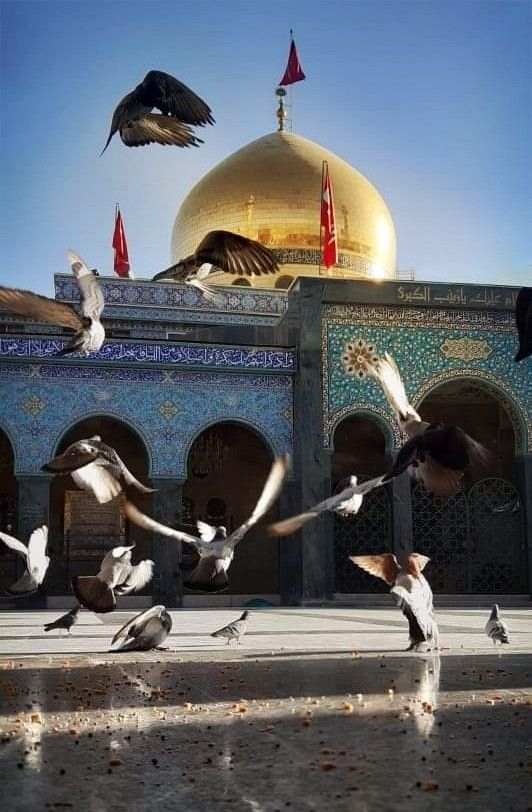Seyed Hashem Moosavi
Introduction
The blessed birth of Lady Zaynab (peace be upon her) marks the arrival of a woman who embodied both gentleness and strength in their highest forms-a figure who stands as a symbol of deep familial compassion while also emerging as a heroine in some of the most decisive moments in Islamic history. In a world that often reduces women either to mere emotion or portrays them as detached and unfeeling, the legacy of Zaynab offers a radiant and inspiring response to such false dichotomies.
A proper understanding of her life does more than illuminate the true image of a Muslim woman; it opens new horizons of strength, intellect, and compassion for society at large.
In this issue, on the auspicious occasion of her birth anniversary, we seek to explore one of the most profound dimensions of her character and answer a fundamental question about the unique synthesis of emotion and reason in her life and legacy.
How Can a Woman Be Both the Kindest Sister and the Stead fastest Fighter?
Lady Zaynab (peace be upon her) stands as a radiant example of the harmonious union of intellect, emotion, faith, and social responsibility. Within her family, she was a source of comfort for grieving hearts and the loving sister of Imam Husayn (peace be upon him). In the public arena, she rose as a fearless standard-bearer of truth, enlightenment, and resistance.
This remarkable balance between tenderness and strength presents a timeless model for faithful women and men throughout history.
In the following pages, we will explore some of the luminous facets of her extraordinary character and reflect on how her legacy can serve as a living guide for both our personal and social lives.
- The Roots of Compassion in the Household of the Ahl al-Bayt
Lady Zaynab (peace be upon her) was nurtured in the embrace of a family unparalleled in virtue: a father like Ali ibn Abi Talib, a symbol of justice and wisdom, and a mother like Fatimah al-Zahra, the embodiment of love and purity (peace be upon them). In such a household, compassion was not a mere fleeting emotion but a divine and formative force, cultivated as part of spiritual and moral growth.
Her sisterly affection for Imam Husayn (peace be upon him) was deeply rooted from childhood, blossoming fully in the tragic events of Karbala. Yet the crucial point is that this love was always guided by the path of mission and truth, directed toward higher purposes rather than personal or transient feelings.
- Zaynabi Rationality: The Foundation of Compassion
Lady Zaynab (peace be upon her) was far more than a devoted sister; she was a thoughtful, profound, and aware woman, inheriting the knowledge and insight of the Ahl al-Bayt (peace be upon them). Her historic speeches in Kufa and Damascus, which stirred dormant consciences and revealed the true face of her enemies, demonstrate a level of intellect and analytical power capable of awakening public opinion even amid the greatest crises.
At the conclusion of one such speech, Imam al-Sajjad (peace be upon him) addressed her, saying: «أنتِ بِحَمدِ اللّٰهِ عالِمَةٌ غَیرُ مُعَلَّمَة؛“By the grace of God, you are a learned and wise lady, though never formally taught” (Tabarsi, Al-Ihtijaj, 1386 AH, vol. 2, pp. 29–31).
Through this description, Lady Zaynab became known as ‘ʿĀlimah Ghayr Muʿallamah’–a title reflecting her elevated spiritual and intellectual status. Prominent Shi‘i philosopher and exegete Ayatollah Abdullah Javadi Amoli has regarded this statement of Imam al-Sajjad as a testament to her infallibility and spiritual authority. Many scholars also interpret it as evidence of her special, divinely granted knowledge (ʿIlm Ladunni), a wisdom rooted in her intimate connection with the Divine and beyond ordinary human instruction.
This rationality represents the supreme wisdom the Qur’an emphasizes:
«يُؤْتِي الْحِكْمَةَ مَن يَشَاءُ وَمَن يُؤْتَ الْحِكْمَةَ فَقَدْ أُوتِيَ خَيْرًا كَثِيرًا
“He grants wisdom to whom He wills, and whoever is granted wisdom has indeed been given abundant good” (Qur’an, 2:269). Lady Zaynab perfected this wisdom under the guidance of the Qur’an and the teachings of her noble father, Ali ibn Abi Talib (peace be upon him).
She demonstrated this profound rationality most vividly in her speech in Damascus, confronting Yazid ibn Mu‘awiyah. With the power of her words, she unveiled the deceit of the oppressors. As she declared: «فَکِد کَیْدک وَاسْعَ سَعْیک و ناصِبْ جُهْدَک فوالله لا تمحُو ذکرنا و لا تُمیتُ وَحْیَنا؛ “Do all you can, plan your schemes, and exert your utmost effort, for by God, you shall never erase our memory nor extinguish our revelation” (Al-Khwarizmi, Maqtal al-Husayn, vol. 2, p. 71).
Here is a woman who balances intellect and faith with heartfelt compassion-a woman who defeats her enemy not through emotional outcry, but through reasoned argument and unwavering moral courage.
- Beautiful Patience: The Union of Emotion and Reason
One of the most remarkable traits of Lady Zaynab (peace be upon her) is the patience the Qur’an describes as ṣabr jamīl–“beautiful patience”: «فَصَبْرٌ جَمِيلٌ وَاللَّهُ الْمُسْتَعَانُ عَلَىٰ مَا تَصِفُونَ؛ “So patience is most fitting; and Allah is the one sought for help against that which you describe” (Qur’an, 12:18).
She weeps for the loss of her dearest loved ones, yet she never retreats from the path of truth. This is the moment where emotion and reason converge-not numbness, nor uncontrolled sentimentality.
In the midst of overwhelming tragedy, Zaynab stands firm, declaring: «ما رأیتُ إلا جمیلاً؛ “I saw nothing but beauty” (Maqtal al-Husayn, p. 184). In this statement, amidst the pinnacle of grief, shines a profound, monotheistic insight-a perspective that channels heartfelt emotion through the guidance of faith.
This spirit reflects the very description of true believers in the Qur’an: «الَّذِينَ إِذَا أَصَابَتْهُمْ مُصِيبَةٌ قَالُوا إِنَّا لِلَّهِ وَإِنَّا إِلَيْهِ رَاجِعُونَ؛ “Those who, when afflicted with calamity, say: ‘Indeed we belong to Allah, and indeed to Him we shall return’” (Qur’an, 2:156).
Through this lens, Lady Zaynab exemplifies the harmonious blending of heartfelt emotion and enlightened reason, demonstrating that true strength lies not in suppressing feeling, but in directing it through faith and wisdom.
- Compassion Alongside Resistance
From the beginning to the end of the tragedy of Karbala, Lady Zaynab (peace be upon her) embodied the gentlest face for the Ahl al-Bayt-caring for the sick, supporting children, comforting women, and standing by her brother, Imam Husayn (peace be upon him). Yet this same compassionate woman delivered a speech in Damascus that shook the palace of tyranny to its foundations.
This is not a contradiction; rather, it is the perfect model of a true believer-one who can possess a tender heart and a will harder than steel.
In Islamic understanding, compassion and resistance against oppression are not opposing forces; they are the two wings that enable the believer to soar. The Qur’an describes true believers as: «أَذِلَّةٍ عَلَى الْمُؤْمِنِينَ أَعِزَّةٍ عَلَى الْكَافِرِينَ؛“They are humble toward the believers, and mighty against the disbelievers” (Qur’an, 5:54).
Lady Zaynab was the living embodiment of this verse, demonstrating that genuine faith unites gentleness with unwavering courage.
- Lessons for Women and Men Today
The legacy of Lady Zaynab (peace be upon her) is not confined to the past; she remains a timeless model for all generations.
- For Women: She demonstrates that a woman can be active, thoughtful, compassionate, and resilient without compromising her religious identity. The Qur’an affirms the mutual responsibility of believing men and women:
«وَالْمُؤْمِنُونَ وَالْمُؤْمِنَاتُ بَعْضُهُمْ أَوْلِيَاءُ بَعْضٍ، يَأْمُرُونَ بِالْمَعْرُوفِ وَيَنْهَوْنَ عَنِ الْمُنْكَرِ… ؛
“The believing men and believing women are allies of one another; they enjoin what is right and forbid what is wrong…” (Qur’an, 9:71).
Lady Zaynab exemplified this verse in practice, bringing the principles of enjoining good and forbidding wrong vividly to life.
- For Men and Community leaders: Zaynab showed that a woman’s role in an Islamic society is not confined to the home; she can assume critical responsibilities in conveying the truth and defending justice, even in the most pivotal historical moments. As the Prophet Muhammad (peace be upon him and his family) stated: «النِّساءُ شَقائقُ الرِّجال؛ “Women are the counterparts of men” (Sunan Abu Dawood, vol. 1, p. 32).
- For Society Today: When emotion and compassion are guided by intellect and faith, they can become the driving force behind cultural, moral, and social movements-just as Zaynab’s speeches sowed the seeds of awakening in the heart of history.
Conclusion
Lady Zaynab (peace be upon her) stands as a unique exemplar of harmony between heart and mind. She weeps with compassion yet speaks with reason; she burns with love yet stands with unwavering intellect; within her flow’s profound affection, while outwardly she radiates formidable strength.
In a world that at times glorifies unchecked emotion in the name of freedom, and at other times elevates cold rationality over the heart, the legacy of Zaynab offers a clear path back to human balance-a balance rooted in faith in God.
The Qur’an also praises moderation and balanced conduct in various verses, including: «وَالَّذِينَ إِذَا أَنفَقُوا لَمْ يُسْرِفُوا وَلَمْ يَقْتُرُوا وَكَانَ بَيْنَ ذَٰلِكَ قَوَامًا؛ “And those who, when they spend, are neither extravagant nor stingy, but hold a just balance between those extremes” (Qur’an, 25:67).
This principle of moderation is not limited to financial matters; it provides a model for balance in all human behaviour-emotions, decisions, social relations, and even worship. Such an approach cultivates a well-rounded, effective personality that earns divine pleasure.
The steadfastness of Lady Zaynab (peace be upon her) amidst overwhelming emotion exemplifies this admirable balance:
- Neither indulgence in uncontrolled emotion,
- Nor cold detachment,
- But qawam-a harmony between intellect and feeling.
She teaches us that one can be both loving and wise, compassionate yet decisive-a lesson of profound relevance for the modern human.







